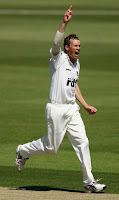
Having spent much of the last week vegging out watching Wimbledon and the World Cup, I am struck by the contrast between the slick appeals system at Wimbledon, and the complete absence of a similar system, or even calls for a similar system, at the World Cup. This is despite the fact that bad refereeing decisions have a bigger impact in football, where one goal often is decisive, than in tennis, where hundreds of points are played every match.
 For instance, when Italy was down 1-2 against Slovenia, Fabio Quagliarella appeared to have equalized. The goal was disallowed because of an offside call. Replays showed that Quagliarella was onside. If Italy had referred that decision to a third umpire, the goal would have been allowed, with potentially huge consequences. I thought the USA were also robbed of a glorious win against Slovenia, when their goal to go up 3-2 was disallowed. Yet, none of the players, managers or talking heads on TV were outraged at this injustice, or were calling for third umpires. The technology clearly exists. There just doesn’t seem to be any underlying or latent demand for referrals in football. How come?
For instance, when Italy was down 1-2 against Slovenia, Fabio Quagliarella appeared to have equalized. The goal was disallowed because of an offside call. Replays showed that Quagliarella was onside. If Italy had referred that decision to a third umpire, the goal would have been allowed, with potentially huge consequences. I thought the USA were also robbed of a glorious win against Slovenia, when their goal to go up 3-2 was disallowed. Yet, none of the players, managers or talking heads on TV were outraged at this injustice, or were calling for third umpires. The technology clearly exists. There just doesn’t seem to be any underlying or latent demand for referrals in football. How come?Dan Ariely, an always entertaining economist, might have a clue. Here, he talks about why we are much more sensitive to the price of petrol than, say, to the price of milk.
 He thinks it is because:
He thinks it is because:“For the several minutes that I stand at the pump, all I do is stare at the growing total on the meter — there is nothing else to do. And I have time to remember how much it cost a year ago, two years ago and even six years ago.
I suspect that if I stood next to the yogurt case in the supermarket for five minutes every week with nothing to do but stare at the price, I would also know how much it has gone up — and I might become outraged when yogurt passed the $2 mark.”
The point is, there is a natural break in the rhythm of our activity when we buy petrol, which is not there when we walk down super market aisles sticking stuff into a trolley. That break changes the way we absorb and respond to information.
With tennis, there is a natural break in the activity after every point. That break makes it easier to work up a rage at bad umpiring calls (remember McEnroe?). That break also makes it easy to insert a referral into the game. Ditto for cricket.
With football or basketball, the ball is back in play immediately. The clock is ticking down. There is less opportunity to work up a rage about a bad decision. Players and fans can't dwell on the past because the future is already playing. Inserting a referral into the game breaks up the tempo of the game in an unnatural, annoying way.
While it is disappointing that Italy crashed out (in the interests of full disclosure, I had a bet on Italy winning the World Cup at 18/1), maybe this is good for the game. A sport with no referrals teaches us to suck up the referee’s calls, shut up, and get on with the game. Maybe, in that way, football builds character.









